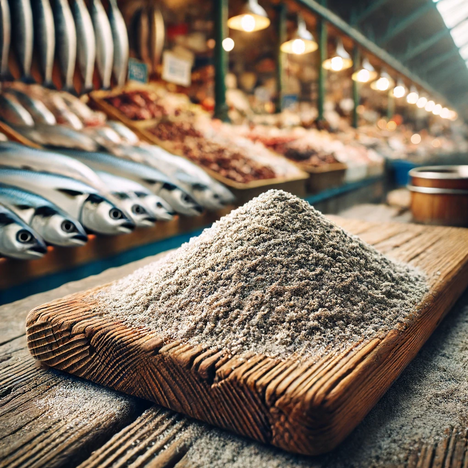Sardine flour

Fish is not only an enrichment for the human diet, but can also provide enthusiasm in our dogs' bowls. Among the various fish products available for dogs, one stands out in particular: sardine meal. This finely ground product, made from whole sardines, promises a wealth of nutrients and health benefits. However, as with any animal feed, there are pros and cons to consider. This article dives deep into the world of sardine meal to explore what makes it so special and what you should look out for if you're considering introducing it into your dog's diet.
What is sardine flour?
Sardine flour is made from whole sardines, which are dried and processed into a fine powder. This flour is rich in proteins, omega-3 fatty acids, vitamins and minerals, making it a high-quality supplement in dog nutrition. Its high nutritional value and the fact that it can be a more sustainable option compared to other animal protein sources have made sardine meal a popular choice for dog owners and pet food manufacturers.
Nutritional richness and health benefits
A boost for skin and coat
Omega-3 fatty acids, especially EPA and DHA, are known for their anti-inflammatory properties. They can contribute to healthy skin and a shiny, healthy coat. Sardine meal, as an excellent source of these fatty acids, can therefore have a positive effect on your dog's external appearance.
Heart health and more
The omega-3 fatty acids contained in sardine meal not only support skin and coat, but also contribute to heart health. They can help regulate blood pressure, lower triglyceride levels and reduce the risk of heart disease.
Supporting the immune system
Sardine flour is rich in vitamins such as vitamin D and B vitamins, which play an essential role in the immune system. Vitamin D, for example, supports bone health and helps regulate the immune system.
Potential disadvantages and considerations
Exposure to heavy metals
A commonly voiced disadvantage of fish products, including sardine meal, is potential exposure to heavy metals such as mercury. However, due to their short lifespan and position at the bottom of the food chain, sardines tend to accumulate lower levels of heavy metals than larger fish.
Allergies and intolerances
Some dogs may be allergic to fish or specific fish products. It is important to be aware of possible allergic reactions when introducing sardine meal into your dog's diet.
Overfeeding
Although sardine meal offers numerous health benefits, it is important to monitor the amount fed to your dog. Overfeeding can lead to weight gain and other health problems.
Sardine meal offers a wealth of health benefits for dogs, from improved skin and coat condition to supporting the immune system and heart health. Despite the potential drawbacks, such as concerns about heavy metal exposure and individual intolerances, sardine meal can be a nutrient-rich addition to your dog's diet when used and dosed correctly. As with any food supplement, it is crucial to use moderation and keep your dog's individual needs and reactions in mind.
If you notice any signs of hypersensitivity or poisoning in your dog, you should see your vet immediately. We are not a substitute for a vet, but we try to be as accurate as possible. Every dog reacts differently and we recommend you get a second opinion or consult your vet if in doubt.
Stay healthy and take good care of your four-legged friend!😊